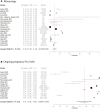The risk of miscarriage following COVID-19 vaccination: a systematic review and meta-analysis
- PMID: 36794918
- PMCID: PMC10152171
- DOI: 10.1093/humrep/dead036
The risk of miscarriage following COVID-19 vaccination: a systematic review and meta-analysis
Abstract
Study question: What is the risk of miscarriage among pregnant women who received any of the COVID-19 vaccines?
Summary answer: There is no evidence that COVID-19 vaccines are associated with an increased risk of miscarriage.
What is known already: In response to the COVID-19 pandemic, the mass roll-out of vaccines helped to boost herd immunity and reduced hospital admissions, morbidity, and mortality. Still, many were concerned about the safety of vaccines for pregnancy, which may have limited their uptake among pregnant women and those planning a pregnancy.
Study design, size, duration: For this systematic review and meta-analysis, we searched MEDLINE, EMBASE, and Cochrane CENTRAL from inception until June 2022 using a combination of keywords and MeSH terms.
Participants/materials, setting, methods: We included observational and interventional studies that enrolled pregnant women and evaluated any of the available COVID-19 vaccines compared to placebo or no vaccination. We primarily reported on miscarriage in addition to ongoing pregnancy and/or live birth.
Main results and the role of chance: We included data from 21 studies (5 randomized trials and 16 observational studies) reporting on 149 685 women. The pooled rate of miscarriage among women who received a COVID-19 vaccine was 9% (n = 14 749/123 185, 95% CI 0.05-0.14). Compared to those who received a placebo or no vaccination, women who received a COVID-19 vaccine did not have a higher risk of miscarriage (risk ratio (RR) 1.07, 95% CI 0.89-1.28, I2 35.8%) and had comparable rates for ongoing pregnancy or live birth (RR 1.00, 95% CI 0.97-1.03, I2 10.72%).
Limitations, reasons for caution: Our analysis was limited to observational evidence with varied reporting, high heterogeneity and risk of bias across included studies, which may limit the generalizability and confidence in our findings.
Wider implications of the findings: COVID-19 vaccines are not associated with an increase in the risk of miscarriage or reduced rates of ongoing pregnancy or live birth among women of reproductive age. The current evidence remains limited and larger population studies are needed to further evaluate the effectiveness and safety of COVID-19 vaccination in pregnancy.
Study funding/competing interest(s): No direct funding was provided to support this work. M.P.R. was funded by the Medical Research Council Centre for Reproductive Health Grant No: MR/N022556/1. B.H.A.W. hold a personal development award from the National Institute of Health Research in the UK. All authors declare no conflict of interest.
Registration number: CRD42021289098.
Keywords: COVID-19 vaccination; live birth; miscarriage; pregnancy loss; vaccine safety.
© The Author(s) 2023. Published by Oxford University Press on behalf of European Society of Human Reproduction and Embryology.
Conflict of interest statement
All authors declare no conflict of interest.
Figures




Comment in
-
Increased risk of fetal loss after COVID-19 vaccination.Hum Reprod. 2023 Dec 4;38(12):2536. doi: 10.1093/humrep/dead204. Hum Reprod. 2023. PMID: 37823793 Free PMC article. No abstract available.
-
Reply: Increased risk of fetal loss after COVID-19 vaccination.Hum Reprod. 2023 Dec 4;38(12):2536-2537. doi: 10.1093/humrep/dead203. Hum Reprod. 2023. PMID: 37823795 No abstract available.
References
-
- Aharon D, Canon CM, Hanley WJ, Lee JA, Lederman MA, Stein DE, Copperman AB.. mRNA COVID-19 vaccines do not compromise implantation of euploid embryos. Fertil Steril 2021;116:e77.
-
- Aharon D, Lederman M, Ghofranian A, Hernandez-Nieto C, Canon C, Hanley W, Gounko D, Lee JA, Stein D, Buyuk E. et al. In vitro fertilization and early pregnancy outcomes after coronavirus disease 2019 (COVID-19) vaccination. Obstet Gynecol 2022;139:490–497. - PubMed
-
- American College of Obstetricians and Gynecologists. COVID-19 Vaccination Considerations for Obstetric–Gynecologic Care. American College of Obstetricians and Gynecologists, 2022. https://www.acog.org/clinical/clinical-guidance/practice-advisory/articl....
Publication types
MeSH terms
Substances
Grants and funding
LinkOut - more resources
Full Text Sources
Medical
Research Materials

